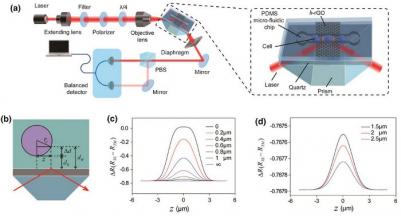Researchers from Nankai University developed a single-cell sensor (optical refractive index sensor) based on graphene field-effect transistors. This new sensor is able to detect a single cancer cell.

The researchers managed to obtain such ultrahigh sensitivity by controlling the thickness of high-temperature reduced graphene oxide. The resolution obtained is the highest values reported for refractive index sensors."
To detect a cancer cell, they use the fact that the refractive indices of cancer cells are significantly larger than those of normal cells. Currently, this flow sensing method can only study blood cells that are suspended, and the types of cells that can be analyzed is still very limited. There's still a lot of research and work to be done to solve these issues.
The researchers also note that the sensors can be used in other areas - such as drug discovery, environmental monitoring, and gas- and liquid-phase chemical sensing.



